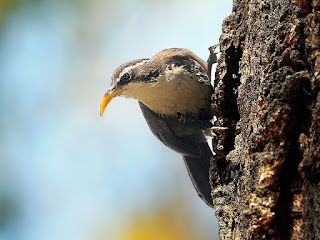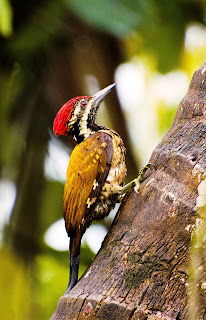 |
| Watching Birds at Meriyanda Nature Lodge ~ Coorg |
Coorg is home to an evergreen rainforest, the origin of a mighty river Kaveri, unending omnipresent coffee plantations and lush green thickets, which makes it an apt landscape for the birds to congregate and a haven for bird watchers and nature photographers across the globe.
This unique setting at our resort in Coorg offers landscape and philosophy that draws you closer to the avian wonders. The glass paneled wooden cottages offer many opportunities to spot birds which not only takes your breath away with their occasional sight but also with their rhythmic orchestrated sound that soothes your soul.
 |
| Watching Birds at Meriyanda Nature Lodge ~ Coorg |
Here is where the birds convene in the chorus. Whistling scarlet Minivets, Drumming black-rumped Flamebacks, highly arboreal Oriental White-eyes, Perched Malabar Trogon, Yellow-browed Bulbuls, Barbets and more, as Coorg is home to a quarter of all avian breeds in India and some of them being endemic species.
Our landscape spreads in about 40 acres of verdant forest and coffee plantation, with a natural river flowing within which gives you ample opportunities to spot Canary-flycatcher, the yellow oriole, the Malabar Barbet or even just a forest myna.
The mere climb into the woods is enough reason for delight. Roost of the nocturnal Ceylon Frogmouth at dawn and dusk may add to the experience, as you walk along the sentinel trees that has loomed over the plantations for over a century. Experience peace as the music of the birds drowns out all the sounds that ever plagued you. Join us as you take some time off the burdens of expectations and rejuvenate yourself.
All you need is patience, stillness, mindfulness, early-rising and of course your binoculars, and our in-house guide will help you highlight the areas to spot birds.
So take the plunge to be an ornithologist even if you just turn out to be an amateur birdwatcher, at least you get to go some feet closer to these magical beings of nature and its ways.
You can locate these beautiful species not only in our resort but also in and around Coorg. The hotspots include Talakaveri Wildlife Sanctuary, Brahmagiri Wildlife Sanctuary, Pushpagiri Wildlife Sanctuary and the Nagarhole National Park
So as Karnataka Tourism declares the year 2017 as the "Year of the wild" do take a vow to educate and sensitize yourself to the miracles and wonders of nature which our biodiversity hotspot offers you.
 |
| Watching Birds at Meriyanda Nature Lodge ~ Coorg |
List of Birds to Watch in Coorg
Indian Scimitar-babblers have long down-curved yellow bills, used to work through the leaf litter in search of their food which is mainly insects and berries. The long curve yellow, scimitar-shaped bills give them their name It is found in peninsular India and is found in a range of forest habitats.
 |
| Indian scimitar babbler |
 |
| Indian scimitar babbler |
The Scarlet Minivet is 20–22 cm (7.9–8.7 in) long with a strong dark beak and long wings. The male has black upperparts and head, and scarlet underparts, tail edges, rump and wing patches. The shape and colour of the wing patches and the shade or orange in the male vary across populations. The female is grey above, with yellow underparts (including the face), tail edges, rump and wing patches.
 |
| Female Scarlet Minivet |
 |
| Male Scarlet Minivet |
Oriental White-Eyes
This species is 18–20 cm long; it lacks the two elongated central tail feathers possessed by most of its relatives. This bird is small (about 8–9 cm long) with yellowish olive upper parts, a white eye ring, yellow throat and vent. The belly is whitish grey but may have yellow in some subspecies. They are easily identified by the distinctive white eye-ring and overall yellowish upperparts.
This species is 18–20 cm long; it lacks the two elongated central tail feathers possessed by most of its relatives. This bird is small (about 8–9 cm long) with yellowish olive upper parts, a white eye ring, yellow throat and vent. The belly is whitish grey but may have yellow in some subspecies. They are easily identified by the distinctive white eye-ring and overall yellowish upperparts.
 |
| Oriental White-Eyes |
Malabar Trogon
These birds are brightly coloured. The male has a slaty-black head and breast with a white border to the black bib separating it from the crimson on the underside. The back is olive-brown to chestnut. The wing coverts are black with fine white vermiculations.
These birds are brightly coloured. The male has a slaty-black head and breast with a white border to the black bib separating it from the crimson on the underside. The back is olive-brown to chestnut. The wing coverts are black with fine white vermiculations.
The female lacks the contrasting black and crimson and has only a slightly darker head and breast that shades into the olive brown on the back while the crimson of the underside of the male is replaced by ochre. In both sexes, the beak is bluish as is the skin around the eye. The iris is dark brown and the feet are pale bluish. The nostrils are covered by tufts of filoplumes. The feet are heterodactyl, a feature unique to the trogons, with the inner toe turned backwards
 |
| Male Malabar-Trogon |
 |
| Female Malabar-Trogon |
This slim wagtail has a narrow white supercilium and a broken eye ring. The upperparts are grey and the yellow vent contrasting with whitish underparts makes it distinctive.. They forage singly or in pairs on meadows or on shallow water marshes. They also use rocks in the water and will often perch on trees.
 |
| Grey Wagtail |
Adult white-breasted waterhens have mainly dark grey upperparts and flanks, and a white face, neck and breast. The lower belly and under tail are cinnamon coloured. The body is flattened laterally to allow easier passage through the reeds or undergrowth. They have long toes, a short tail and a yellow bill and legs. Sexes are similar but females measure slightly smaller. Immature birds are much duller versions of the adults. The downy chicks are black, as with all rails
 |
| White-breasted Waterhen |
The yellow-browed bulbul is mainly yellow on the underside and olive above with a distinct yellow brow. They are easily located by their loud calls but tend to skulk within foliage below the forest canopy. They are found in pairs or small groups and call loudly. They feed mainly on berries and insects. The breeding season is during the dry spell before the monsoons, mainly January to May. The nest is a cup built in a low fork covered with moss and cobwebs on the outside, giving the appearance of a large white-eye nest, and lined with fine root fibers
 |
| Yellow-browed Bulbul |
 |
| Yellow-browed Bulbul |
White Cheeked Barbet is endemic to the forest areas of the Western Ghats and adjoining hills. Like many other barbets of Asia, these are green, sit still, and perch upright making them difficult to spot. During the breeding season which begins at the start of summer their calls become loud and constant especially in the mornings. The call, a monotonous Kot-roo ... Kotroo... starting with an explosive trrr is not easily differentiated from that of the brown-headed barbet. Like woodpeckers, the barbets perch on the trunk to hollow their nest. These barbets play an important role in forests as seed dispersal agents
 |
| White Cheeked Barbet |
The black-rumped flameback is a large species at
26–29 cm in length. It has a typical woodpecker shape, and the golden
yellow wing coverts are distinctive. The rump is black and not red as in the
greater flameback. The underparts are white with dark chevron markings.
This species is normally seen in pairs or small parties and
sometimes joins mixed-species foraging flocks. They forage from the ground to
the canopy. They feed on insects mainly beetle larvae from under the bark,
visit termite mounds and sometimes feed on nectar. As they make hopping movements around
branches, they often conceal themselves from potential predators. They adapt
well in human-modified habitats making use of artificial constructions fallen fruits and even food scraps. |
| Black- Rumped Flamebacks |
The Malabar grey hornbill (Ocyceros griseus) is a hornbill
endemic to the Western Ghats and associated hills of southern India. They have
a large beak but lack the Casque that is prominent in some other hornbill
species. They are found mainly in dense forest and around rubber, arecanut or
coffee plantations. They move around in small groups, feeding on figs and other
forest fruits. Their loud cackling and laughing call makes them familiar to
people living in the region.
 |
| Malabar Grey Hornbill |
 |
| Malabar Grey Hornbill |
The grey-headed canary-flycatcher sometimes known as the grey-headed flycatcher (Culicicapa ceylonensis) is a species of small flycatcher-like bird found in tropical areas and western Ghats. It has a square crest, a grey hood and yellow underparts. They are found mainly in forested habitats where they often join other birds in mixed-species foraging flocks
 |
| Grey-Headed Canary-Flycatcher |
 |
| Grey-Headed Canary-Flycatcher |
Other birds in Coorg
Grey Wagtail
Large Billed Crow
Barn Swallow
The Black-Crested Bulbul
Whitecheeked Barbet
Coppersmith Barbet
Hill Myna Or Forest Myna.
Blue-Cappedrock Thrush
Crimson-Fronted Barbet (Malabar Barbet)
Pompadour Green Pigeon
Asian Brown Flycatcher
White-Bellied Woodpecker
Greater Coucal Or Crow Pheasant
Brahminy Kite
Scaly-Breasted Munia
Black Kite
Spotted Dove
Laughing Dove
Purple Sun Bird
Ceylon Frogmouth
Asian Paradise Flycatcher
Pale-Billed Flowerpecker
House Sparrow
Red-Whiskered Bulbul
Malabar Whistling Thrush
Long-Tailed Shrike
Asian Fairy Bluebird
Common Flameback(Common Goldenback
Rose-Ringed Parakeet
Blue-Winged Parakeet
Greater Racket-Tailed Drongo
Purple-Rumped Sunbird
Canary Flycatcher
Ashy Drongo
Chestnut-Headed Bee-Eater
Oriental White-Eye
Scarlet Minivet
Black Bulbul
The Yellow Oriole
Golden-Fronted Leafbird
The Malabar Barbet
Malabar Trogon
Vernal Hanging Parrot
Little Grebe
Black-Winged Stilt
Little Ringed Plover
The Red-Naped Ibis
White-Eyed Buzzard
Jungle Babbler's
Spot-Bellied Eagle-Owl
The Rufous Treepie
Yellow-Wattled Lapwing
Red-Wattled Lapwing
Come enjoy the birding season in Coorg at Meriyanda Nature Lodge- Coorg- http://www.meriyanda.com/

Thanks for sharing the useful details about Watching Birds in Coorg. Keep writing more interesting blogs like this.
ReplyDeleteGolden Oaks Villa in Yercaud
This is a very interesting post on the fauna of Coorg.
ReplyDeleteCoorg has such a rich ecosystem and birds are an important part of it. We need to do all that we can to ensure these beautiful creatures have hope for survival!
Are these pictures of birds you have taken at Meriyanda?
Thanks for the detailed and informative post!
IBNISPRING offers cheap cottages in Coorg for stay during holiday in Coorg. Guests can enjoy various activities here. Contact at +91-8877118861 for more details.
ReplyDelete